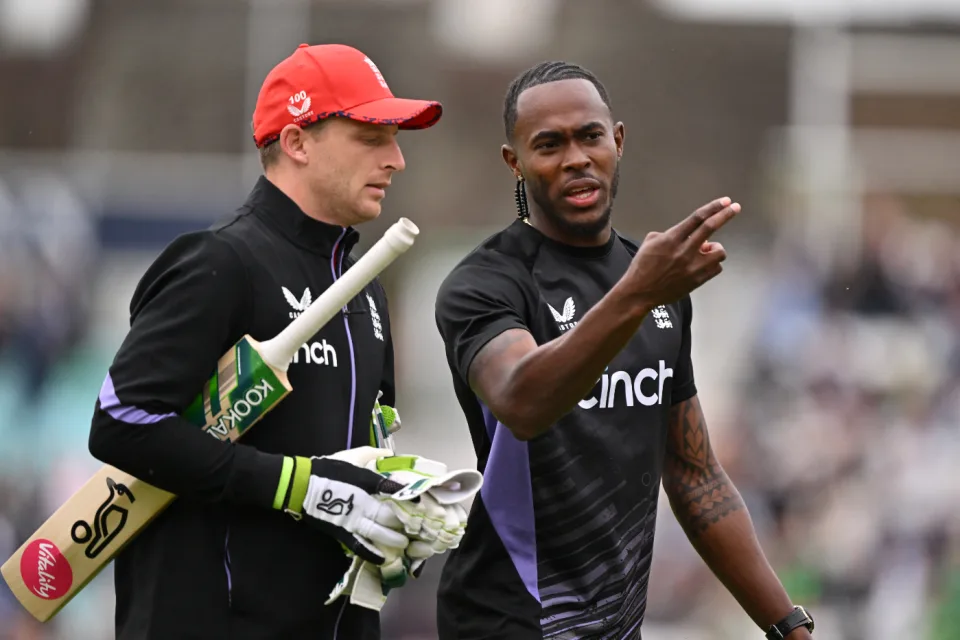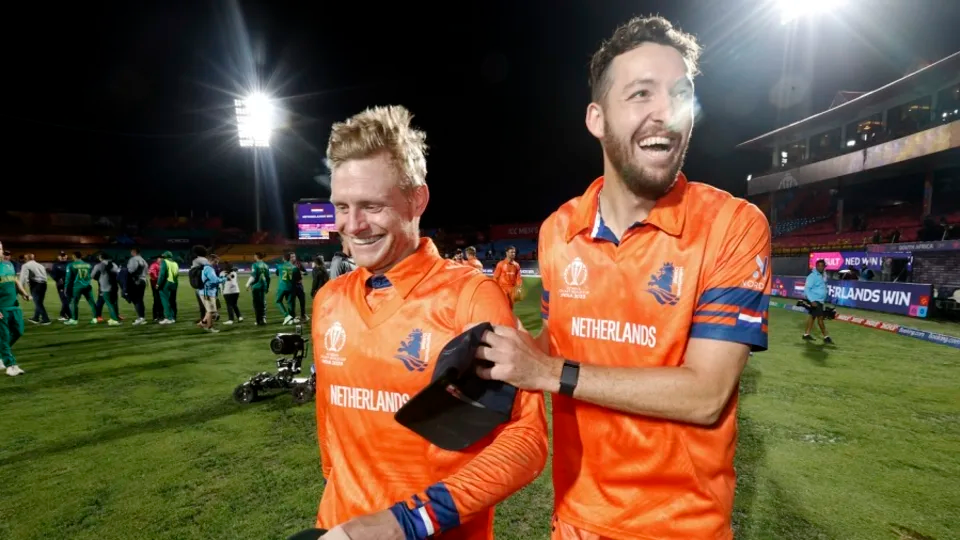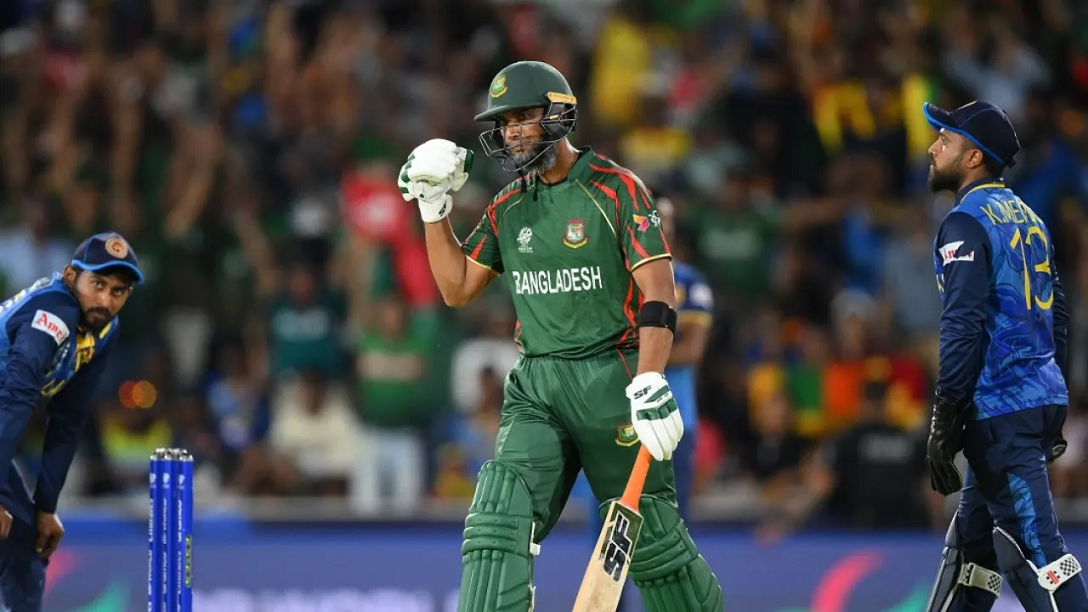Sports
Former New Zealand all-rounder John R Reid passes away at 92

John Richard Reid, former New Zealand great and their oldest surviving Test player, has died at the age of 92 in Auckland.
Reid was an exceptional all-rounder, who not only displayed aggression in the batting and bowling aspects of the game, but also impressed with his incredible skills in the field.
He was thought of as a strong rugby player in his youth, but a severe bout of rheumatic fever forced him out of the sport in his teens.
However, the setback did not stop Reid from achieving immense success in a different sport – he scored 3428 runs in 58 Test matches with an average of 33.28, hitting 22 half-centuries and six centuries in a career that spanned over 16 years. His maiden Test century, a knock of 135, came against South Africa in Cape Town in 1954.
 He scored two fifties in his debut series, against England, and was the only surviving member of the famous 49ers – the team that brought New Zealand cricket to the world stage when they toured England in 1949.
He scored two fifties in his debut series, against England, and was the only surviving member of the famous 49ers – the team that brought New Zealand cricket to the world stage when they toured England in 1949.
He was a genuine fast bowler at the beginning of his career, but had to sacrifice pace in the latter stages of his career, switching to off-cutters and spin in order to negate potential injuries. He finished with 85 Test scalps to his name, including four five-wicket hauls and best bowling figures of 6/60.
The right-handed batsman was the first captain ever to score 500 runs and pick up 10 wickets in a series with his tally of 546 runs and 11 dismissals in South Africa in 1962. The visitors also drew the series 2-2, which was an incredible achievement for New Zealand cricket at the time. He also held the record for most international runs by a New Zealand cricketer in a calendar year (871 in 1965), before it was broken by Brendon McCullum in 2014.
Reid was the first cricketer to lead New Zealand to a Test victory, when they beat the Windies by 190 runs in Auckland in 1956. He was also the captain when New Zealand defeated South Africa in 1962 to claim their first overseas Test win.
“I was the captain who won the first three Tests for New Zealand. All records are meant to be broken, but that one you can’t break. But when we won our first Test, I had a glass of champagne for the first time. It was special, first win in 27 years,” said Reid in a conversation with Cricket Monthly back in 2009.
“I used to tell some terrible lies – how we are going to win this one and win that one, knowing very well that we wouldn’t. I loved the game. I loved the sportsmanship.”
When the legendary cricketer hung up his boots in 1965, he held the record for the highest number of caps, runs, outfield catches, as well as wickets for New Zealand. He continued to be influential in international cricket even after his retirement. Reid was appointed as a national selector, and then travelled to South Africa for a couple of coaching stints. He also officiated in 50 Tests and 98 one-day internationals as an International Cricket Council match referee.
Reid was diagnosed with cancer in 2013, but fought against it to recover completely after undergoing surgery, and in August 2015, became the oldest surviving Test cricketer from New Zealand after Trevor Barber passed away.
In 1962, Reid was bestowed with the tag of an Officer of the Order of the British Empire for services to the sport. He was also made a Companion of the New Zealand Order of Merit in the New Year Honours of 2014.3
Reid was a prolific first-class cricketer, who played 246 first-class games, scoring 16128 runs at 41.35, while taking 466 wickets at 22.60.
“John R Reid was New Zealand cricket’s Colin Meads,” said New Zealand Cricket chief executive David White. “He was, and will remain, a household name in this country, having helped pave the way for everything that has come in his wake.
“Our thoughts and respect are with his family at this time: wife Norli; children Alison, Richard and Ann, and his grand-children, Oliver, Megan, Christina and Angus.
“NZC will acknowledge and mark John’s wonderful life and career at an appropriate time.” (ICC)
Sports
England face Australia in the battle of champions

The first truly heavyweight clash of this expanded T20 World Cup format comes freighted with both history and subplots. A rematch of the 2010 World T20 final at Kensington Oval, the match pits Jos Buttler’s defending champions – who are aiming to become the first team to retain the trophy – against the Australian winning machine, victors at the 2021 edition and current world title-holders in Test and ODI cricket. And that’s before you throw in the Ashes for afters.
Already there is added pressure on England, after the rain in Bridgetown led to a share of the points in their opener against Scotland (and that having conceded 90 runs from 10 overs without taking a wicket in a tepid bowling display). Lose to their oldest rivals and it will leave their Super 8 prospects open to being waylaid by the perils of net run-rate calculations, or worse.
The Scotland match was the third abandonment in five suffered by England, after a rain-affected home series against Pakistan, which has clearly hampered their readiness for this campaign after almost six months without playing T20 together. It does not take much for a side to click in this format – and England looked in decent shape when they did get on the field against Pakistan – but Buttler will be anxious for things to go their way on Saturday, if only to avoid further questions referencing the team’s disastrous ODI World Cup defence last year.
Australia, under the laidback leadership of Mitchell Marsh would love nothing more than to add to the English sense of jeopardy – having helped bundle them out of the tournament in India on the way to taking the crown. Their head to head record is less impressive in T20 however, with England having won six of the last seven completed encounters, as well as that 2010 final.
Despite a wobble with the bat, Australia avoided mishap against Oman earlier in the week, the experience of David Warner and Marcus Stoinis shining through in difficult batting conditions. Surfaces in the Caribbean – not to mention those games staged in the USA – have already had teams scratching their heads; rather than the “slug-fest” England had prepared for, following a high-scoring tour of the Caribbean in December, it looks as if boxing smart may be the way to go.
Speaking of Warner, this could be the last time he faces up against England in national colours – and another match-winning contribution would likely reduce the chances of them meeting again in the knockouts. On the other side of the card is Jofra Archer, fresh from an emotional maiden outing at Kensington Oval and ready to take on Australia for the first time in any format since 2020. Can Mark Wood fire up England’s campaign, as he did during last summer’s Ashes? Will Pat Cummins be back to harass the old enemy once again? Seconds out, it’s almost time to rumble.
Cummins is set to return after being rested for the Oman game, which saw Mitchell Starc leave the field with cramp. Starc is understood to be fine and could keep his place – which would likely see Nathan Ellis miss out. Marsh is still not fit to bowl, with Australia likely to continue with the allrounder combination of Stoinis and Maxwell to give them cover.
Australia (probable XI): David Warner, Travis Head, Mitchell Marsh (capt), Glenn Maxwell, Marcus Stoinis, Josh Inglis (wk), Tim David, Pat Cummins, Nathan Ellis/Mitchell Starc, Adam Zampa, Josh Hazlewood
The one change England may consider is Reece Topley coming in for Wood, with the expectation that there will be some rotation among the seamers through the course of the tournament.
England (probable XI): Phil Salt, Jos Buttler (capt & wk), Will Jacks, Jonny Bairstow, Harry Brook, Liam Livingstone, Moeen Ali, Chris Jordan, Jofra Archer, Adil Rashid, Reece Topley/Mark Wood
[Cricinfo]
Sports
South Africa up against their bogey team in batter-unfriendly New York

Once is coincidence, twice is a clue, and three times is proof.
To paraphrase Agatha Christie, that is the narrative around South Africa’s meeting with Netherlands at this T20 World Cup.
The Dutch beat South Africa at the 2022 tournament and ended their semi-final hopes in a match where South Africa appeared to be sleep walking, and then beat them again at the 2023 ODI World Cup, where they exposed South Africa’s vulnerability in the chase. If they to do the treble, not only will Netherlands take the lead in Group D, but they will offer conclusive evidence of the threat they pose to Full Members, especially South Africa.
Of course, it will take some doing after South Africa’s opening performance against Sri Lanka, where they reduced their opposition to their lowest T20I total and chased it down in fairly straightforward fashion thanks to the most stable middle-order of their white-ball era. In Aiden Markram, Tristan Stubbs, Heinrich Klaasen and David Miller, South Africa have bankers and big-hitters and, for this match, they also have the advantage of experience. They’ve already played at Eisenhower Park, and have first-hand knowledge that run-scoring doesn’t come easily;Klassen said they are prepared to use their “cricket brains” and play “smarter cricket”.
But the conditions could be good news for Netherlands, who are not naturally a line-up of big hitters and build their innings on a foundation of turning ones into twos. In other words, they tend to take a slightly more conservative approach to batting, which may work well here, but they’ll be wary of the uneven bounce of the surface and will have to come up with plans to counterattack especially against South Africa’s seamers. Their own bowlers were exemplary in Dallas and will look to build on that performance against a line-up that will likely be more proactive than Nepal’s, but who they have managed to keep quiet not once, but twice in the past. Third time’s the charm, they say.
Anrich Nortje’s stunning return to form against Sri Lanka means South Africa may not have to tinker with the bowling combination, and Gerald Coetzee and Tabraiz Shamsi may have to wait their turns to get a game. The batting line-up should be unchanged, with no space for Ryan Rickelton yet.
South Africa: Quinton de Kock (wk), Reeza Hendricks, Aiden Markam, Tristan Stubbs, Heinrich Klaasen (wk), David Miller, Marco Jansen, Keshav Maharaj, Kagiso Rabada, Ottneil Baartman, Anrich Nortje
Conditions in New York may tempt Netherlands to include an extra seamer and they have Kyle Klein in their squad. But it could come at the expense of a shortened batting line-up and they may not want to risk that.
Netherlands: Michael Levitt, Max O’Dowd, Vikramjit Singh, Sybrand Engelbrecht, Scott Edwards (capt, wk), Bas de Leede, Teja Nidamanuru, Logan van Beek, Tim Pringle, Paul van Meekeren, Vivian Kingma
[Cricinfo]
Latest News
Mustafizur, Rishad, Hridoy dazzle in Bangladesh’s tight two-wicket win over Sri Lanka

Nuwan Thushara’s last over brought Sri Lanka screaming back into the match,as he first bowled Rishad Hossain, and then nailed Taskin Ahmed in front of the stumps with a pinpoint swinging yorker. This left Bangladesh eight wickets down, with 12 runs still to get.
However, the experienced Mahmudullah was at the crease for Bangladesh, and despite some further nervy moments, pushed Bangladesh across the line off the last ball of the 19th over.
But this was a match chiefly decided by Bangladesh’s own outstanding bowling. Mustafizur Rahman was the best among them, using shorter lengths and his cutters efficiently, to claim figures of 3 for 17. Rishad Hossain’s three-for through the middle overs also kept Sri Lanka quiet.
Mustafizur was instrumental in Sri Lanka’s downward spiral through the middle overs, which culminated in a crash-and-burn end. Ultimately, their inability to find boundaries, or even rotate strike against good Bangladesh bowling resulted in their downfall. A score of 125 for 9 always seemed poor on a decent pitch, even if their bowlers made a match of it in the end.
Brief scores:
Bangladesh 125 for 8 in 19 overs (Towhid Hridoy 40, Litton Das 36; Dhanajaya de Silva 1-11, Nuwan Thushara 4-18, Wanidu Hasaranga 2-32, Matheesha Pathirana 1-27) beat Sri Lanka124 for 9 in 20 overs (Pathum Nissanka 47, Dhananjaya de Silva 21; Tanzim Hasan Sakib 1-24, Taskin Ahmed 2-25, Mustafizur Rahman 3-17, Rishad Hossain 3-22) by two wickets
[Cricinfo]





















